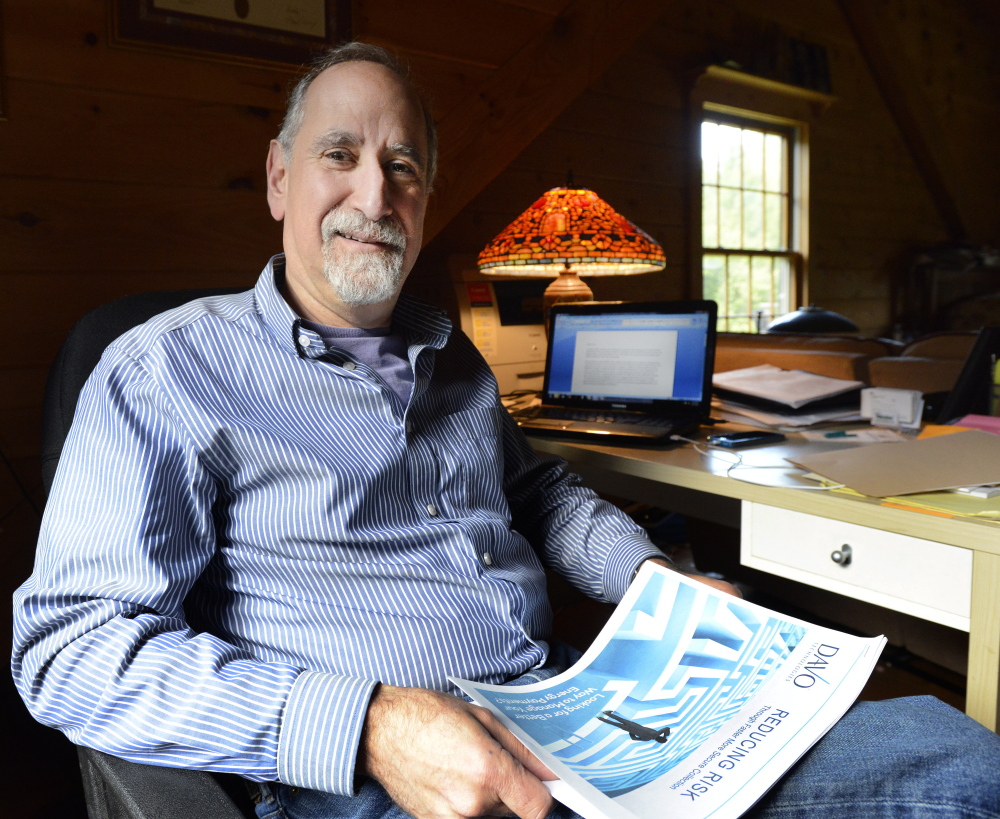As a small-business owner, Matt Mattingly wears many hats. He’s an innkeeper, restaurateur, bookkeeper, human resources manager and chief bottle washer. Inevitably, some things fall through the cracks.
Such as the 8 percent sales tax he is required to collect on the state’s behalf and deliver to Maine’s coffers by the 15th of every month. The process is not automated, which means Mattingly, who owns the PineCrest Inn Bed and Breakfast in Gorham, and other merchants crunch their sales numbers monthly to determine what to send to Maine Revenue Services.
“I’ve woken up at 11:58 and realized I have two minutes (to pay the tax bill) and run down in my pajamas to the office in the inn to jump on the computer and get the payment in before midnight,” Mattingly said.
Thankfully, those middle-of-the-night sprints are a distant memory. Mattingly is one of a small group of merchants who have been beta-testing software developed by a new Maine startup that automates the sales tax collection-and-payment process.
Mattingly, who also owns the adjacent fine-dining restaurant 91 South, estimates he collects and delivers $25,000 a year in sales tax to the state. And as a consequence of wearing so many hats, he estimates he’s paid several hundred dollars in fees for missing the deadline now and then.
Davo Technologies has spent the last several years developing a software product called DavoTax, which allows a merchant’s point-of-sale system to automatically track sales, sequester the sales tax and deliver the total amount to the state each month. The company, which is in the process of moving from New Jersey to Maine, plans to officially launch the product this month.
“There’s no button to push or papers to sign,” said Owen Brown, Davo’s CEO and co-founder. “We want to do for sales tax what ADP has done for payroll: to make it seamless and behind the scenes so you never have to think about it again.”
Davo Technologies was founded in 2001 in New Jersey, but Brown and his co-founder, David Joseph, recently decided to move the startup to Maine, attracted by Portland’s burgeoning hub of payment technology companies and a $156,165 development loan from Maine Technology Institute to help commercialize the product. It doesn’t hurt that Joseph moved to Maine several years ago while the pair was building the business.
Mattingly, the innkeeper, has been beta testing the software since the end of 2013 and has been very impressed. He doesn’t think sales tax will be going away any time soon, so having software that moves it to the background is the next best thing.
“We’re not making any things simpler,” he said. “Our friends in the government tend to make things more complicated, and this is something that makes things simple.”
MILLIONS OF POTENTIAL CUSTOMERS
Joseph and Brown see a massive market for Davo’s technology. Forty-five states and the District of Columbia collect sales tax, which means there are several million small- and medium-sized businesses – potential customers – around the country. Davo’s ideal customers are brick-and-mortar merchants doing $500,000 to $5 million a year in sales. Davo plans to charge a monthly subscription fee for use of the software.
“David and I think we have a transformative technology that’s really going to make a difference in people’s lives,” Brown said. “It’s a real issue for merchants and for states, and we have a solution.”
Additionally, there are developments on a federal level that could require retailers with an e-commerce component to begin collecting sales tax from customers in whatever state they live. That mandate, if it becomes law, would greatly increase the administrative headaches for small retailers that sell to customers all over the country, said Rachelle Bernstein at the National Retail Federation. It could also significantly expand Davo’s market as merchants look for ways to streamline the payment of sales tax to various states with different tax structures.
“Potentially (Davo) sees an opportunity that this is coming along and more people are going to need it,” Bernstein said. “My guess is there could be a lot more companies having these needs in the future.”
Sales-tax collection and payment are a burden to many retailers, said Bernstein. Although she hasn’t heard of Davo Technologies, she knows of other companies claiming to streamline or automate the collection and payment of sales tax for merchants.
“It is an issue, and for companies that can do it efficiently and inexpensively there’s certainly a worthwhile product,” Bernstein said. “But it’s not something that no one has thought of yet.”
While the automated process will benefit the merchants, it will also improve the cash flow for states and strengthen compliance rates. Davo’s system doesn’t have to work on a monthly basis. It could deliver the sales tax on a daily basis if configured to do so, Brown said.
States and their payment systems aren’t necessarily equipped to handle that sort of option, but it is possible. Brown said he and Joseph have already begun talking to Maine Revenue Services about the possibilities.
“It’s in the beginning stages, but we’re very excited about that relationship,” Brown said.
IDEA BORN OUT OF FRUSTRATION
Davo Technologies grew out of David Joseph’s personal experience in the late 1990s as owner of the Blue Sky Cafe in Montclair, New Jersey, and his frustration with the requirement to collect sales tax on behalf of the state.
“When I owned a restaurant, we constantly struggled with sales tax,” he said. “I looked at our credit card terminal and said, ‘Why can’t someone do this for me like for payroll?’ ”
He asked his payment processor if his credit card terminal could keep track and sequester the sales tax. No, it couldn’t. He asked his bank if it could automate the process. It said no.
“That was the seed that started the whole process,” Joseph said.
At the time, Brown was a friend and customer who had 30 years of experience in the financial services industry.
The pair began discussing the business idea in 2000 and founded the company the next year. They spent the next decade developing the process by which DavoTax works and securing a process patent for it. They received the patent in the summer of 2010 and set to work in earnest to better understand the payments industry and how to integrate their now-patented process into the payment arena. During that process, Joseph moved to Bowdoinham, Maine, in 2003.
Davo has four team members, including Brown and Joseph. All except Brown are already in Maine. Brown doesn’t plan to move to Maine, but will commute to the Portland area.
With the MTI funds, Davo intends to hire a half-dozen people, including computer engineers and administrative staff, and move into a permanent office in the Greater Portland area in the next year. The computer coding to this point has been outsourced, but the MTI funds will allow those functions to be moved in-house.
“We’ve got to the point where we need to take more control and develop our product further in-house, and that’s our next step,” Joseph said.
Within four years, Brown and Joseph expect the company to have between 15 and 25 employees and count more than 100,000 merchants as customers. Ultimately, though, their vision is much bigger.
“Potentially this could be a multibillion-dollar valuation business,” Brown said. “We know the business model is scalable to where we could do all the small merchants (in the country), but the question is what kind of traction we get.”
Davo has already signed a deal that Brown and Joseph believe will help them gain significant traction. Along with announcing the official launch of DavoTax, the company also unveiled a partnership with First Data, one of the country’s largest payment processors. First Data works directly with merchants, providing them with the point-of-sale terminals and processing payments. With First Data in Davo’s corner, the company’s technology will quickly reach thousands of potential customers, Brown said.
HUB OF PAYMENT TECHNOLOGY
Dozens of startups around the country are looking to simplify the way people and businesses pay each other. Portland has an active group of companies, employing more than 1,000 people, in this payment processing space.
The company could have stayed in New Jersey where Brown lives, but Greater Portland’s hub of payment technology companies like WEX Inc. in South Portland and PowerPay in Portland prompted Brown and Joseph to decide to move the business to Maine.
“It’s very attractive for us because we can avail ourselves of outside resources that might add value to our product,” Brown said of Portland’s payment technology hub.
Davo was recently selected by a startup accelerator in St. Louis called 630 Ventures that funds and mentors startups in the payment technology space. It only selects four startups a year, so the recognition – and the $100,000 financing that comes with it – is appreciated, Joseph said.
While the sales-tax solution is a good starting point for the company, Brown and Joseph are already thinking about other applications for Davo’s technology. For example, it could be used to help franchisees manage their royalty and advertising fees to franchisers, Brown said.
“We are not tax people – Davo is a technology company in the payment space and right now our key focus is providing a solution for merchants to the sales-tax burden, but we envision solving multiple payment issues,” Brown said.
With the software ready to hit the market, Mattingly looks forward to becoming one of Davo’s first customers. He’s bullish on the potential impact this technology could have on merchants like himself, even going so far as to compare the advent of the technology to the first time he used a cellphone in his car.
“I think it will long-term revolutionize the way we conduct our business,” he said. “It’s exciting to see and it’s right here, not coming out of Japan or Silicon Valley.
“I think it’s a good lesson to anyone else with an idea. You don’t need to go to Japan, you don’t need to be an employee of Microsoft or Apple to make something that has the potential for such a huge impact.”
Copy the Story LinkSend questions/comments to the editors.




Success. Please wait for the page to reload. If the page does not reload within 5 seconds, please refresh the page.
Enter your email and password to access comments.
Hi, to comment on stories you must . This profile is in addition to your subscription and website login.
Already have a commenting profile? .
Invalid username/password.
Please check your email to confirm and complete your registration.
Only subscribers are eligible to post comments. Please subscribe or login first for digital access. Here’s why.
Use the form below to reset your password. When you've submitted your account email, we will send an email with a reset code.